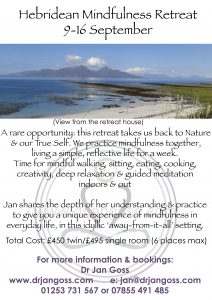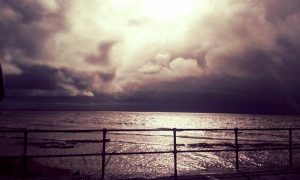Better With Less?
“If you assume that there is no hope, you guarantee that there will be no hope. If you assume that there is an instinct for freedom, that there are opportunities to change things, then there is a possibility that you can contribute to making a better world” (Noam Chomsky).
I came across this quote in my Riverford fruit and veg box last week. Guy Watson, the founder of this ethical, organic farming ‘co-operative’ writes a great newsletter each week. He speaks to my values and the ‘idealist’ in me, the part of me that believes change for the better is possible – an action at a time – and that I can contribute meaningfully to the change I want to see in the world.
Consumption is getting a bit out of hand – you may have noticed – the manufacture, distribution and disposal of clothing for example, is posing almost as large a threat to the Earth as the oil industry. In the US alone over 14 million tons of clothing is thrown away each year – and the cheaper it is, the less likely it is to be recycled. There is always a price to be paid for unmindful consumption, whether of food, clothing, electronic goods or anything else that we have potentially unlimited access to.
We all need to consume, but to what extent? With mindfulness we can make less damaging choices that will ensure protection of our self, other beings and the Earth. The Ethical Consumer Magazine is a great resource that offers robust research into all areas of consumption, so if we want to make a purchase we can find out which choice is the wisest. Maybe, like me, you remember those days when people used to save up for something and appreciate it so much more, as a result? Somebody I was talking to a couple of days ago reminded me that most people used to rent a television…and now many homes seem to have one in every room!
We rarely stop to think of the consequences of continually remodelling, ‘making-over’ and updating, of travelling and experiencing, even though the Earth’s resources are at breaking point. And so, if we aspire to living mindfully we need to pay more attention to what and how we consume, because the oceans are over-flowing with plastic, the ground is drenched in chemicals and the air is full of carbon.
So what can we do?
Each one of us can make a difference…
So ‘how might your life be better with less?’ This is a question that ‘The Minimalists’ ask in their Tedx talk (I recently watched their film too, by the same name – available on Netfilx). It’s interesting to ponder this question and learn from people who have simplified their lives, down-sizing just about everything, including their living space – take a look at the ‘Tiny House Movement’. Although I feel I live simply I know there are things in cupboards that rarely, if ever, see the light of day! So I am taking a leaf out of the minimalists book and letting go of an item a day for the 40 days of Lent (I like to use this time to encourage a healthy habit) and I will see where that takes me…watch this ‘space’.
Of course we may realise that an obsession with consumption speaks of so much more than simply the desire for a comfortable life, it speaks of the need to fill a void, a vacuum inside of us that is potentially infinite and reflects our discontent with ‘what is’ and often our discontent with our self. We attempt to ameliorate the inner malaise with outer ‘stuff’…bonkers huh? Reluctance to let go of possessions too, can speak of a fear-driven ‘lack’ mentality that holds on to what we already have ‘just in case’ we need it!
Consuming, in its myriad forms may make us feel better, but only fleetingly, and so rather than keep on acting out this behaviour, we can choose to engage in the healing personal development work that leads to understanding, away from consumerism and into mindfully enjoying the simple pleasures in life.
Our consumption is killing the Earth – on which we are totally dependent (it is easy to forget this fact) – and along with it many of it’s species, including the human variety. Last night I watched Before The Flood the documentary by Leonardo Di Caprio. It is heart-wrenching to see the violation of the Earth on such an epic scale – for the sake of palm oil, for example. It was helpful to see this and The Minimalists film in close succession, they offer an overview of the ‘problem’ and the ‘solution’. Together they give me hope and something concrete that I can do to make a difference, by making informed and mindful decisions.
Mindfulness teacher Thich Nhat Hanh says ‘Life is filled with suffering, but it is also filled with many wonders, such as the blue sky, the sunshine, and the eyes of a baby. To suffer is not enough. We must also be in touch with the wonders of life. They are within us and all around us, everywhere, in every moment.’
We need to remind ourselves that we can’t buy our way to happiness, that it is an inside job. Our mindfulness practice enables us to connect with these ‘many wonders’ so that we become more content with less and let go of the notion that we can consume our way to happiness.


